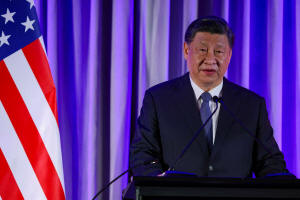From spy balloons to chocolates: Chinese propaganda frames Xi's US pivot
 Send a link to a friend
Send a link to a friend
 [November 16, 2023]
By Antoni Slodkowski and Laurie Chen [November 16, 2023]
By Antoni Slodkowski and Laurie Chen
BEIJING (Reuters) - What a difference eight months makes: In March,
shortly after the U.S. shot down a suspected Chinese surveillance
balloon, President Xi Jinping blamed it for challenges faced by China's
economy, complaining of "all-round containment".
Then on Wednesday, U.S. and Xi agreed to open a presidential hotline,
resume military-to-military communications and work to curb fentanyl
production, showing tangible progress in their first face-to-face talks
in a year at a summit in California.
While key issues like U.S. sanctions on chip exports remain unresolved,
Chinese state media is now striking a different tone, focusing on Xi's
smile during past trips to Iowa, fireside chats with its residents, and
sharing chocolates with Biden.
Clips from the summit on China's social media show the two leaders
walking in gardens at the site of the talks, and chatting by Xi's
official limousine, with discussion of U.S. tech curbs and tension over
Taiwan featuring less prominently.
The Chinese rhetoric seeks to show Xi to a domestic audience as Biden's
equal and highlights his desire to stabilize ties as China grapples with
a moribund economy, analysts say. It also sends a signal of approval to
the bureaucracy and businesses on engaging with Americans.

"It reflects a very strong desire on the part of Chinese leaders to
stabilize relations with the U.S. and push for more cooperation," said
Li Mingjiang, international relations scholar at the Rajaratnam School
of International Studies in Singapore.
"There's this fundamental message in the Chinese narrative that the
Chinese leader is capable of managing China-U.S. relations ... he is the
one who gives instructions to the U.S. and the American leadership on
how to manage the bilateral ties."
China's domestic propaganda machine worked overtime to pave the way for
Xi's pivot, also evident at a dinner with U.S. executives, when he
pledged that China was ready to be a "partner and friend" of the U.S.
and there was "plenty of room for bilateral cooperation".
With official ties still strained, Chinese state media has focused on
relations between the people and emphasized the potential for
cooperation and importance of the summit for the Asia-Pacific region.
"The international community watches with bated breath, recognizing the
weight of this meeting," the state news agency Xinhua said in an
editorial. "When China-U.S. relations are good, the region benefits;
when relations sour, the region suffers."
[to top of second column]
|

China's President Xi Jinping speaks at the "Senior Chinese Leader
Event" held by the National Committee on US-China Relations and the
US-China Business Council on the sidelines of the Asia-Pacific
Economic Cooperation (APEC) summit in San Francisco, California,
U.S., November 15, 2023. REUTERS/Carlos Barria/Pool

'AMERICAN FRIENDS'
Xinhua also ran a 1,500-word report reminiscing about Xi's past
visits to the U.S..
"Xi never forgets his American friends and believes that people hold
the key to state-to-state relations," the news agency said.
The report cited Iowans who helped coordinate a 1985 trip Xi made to
the state as a young official, describing his "smile that would not
stop", and lauding his curiosity. It also described Biden and Xi
sampling chocolates from a box during a past exchange.
Gary Dvorchak, an Iowan considered by Xi an old friend of China,
said Xi's fondness for Iowa was genuine but that the Chinese leader
also used his ties to the state for propaganda value.
“It humanizes him and it gives him an ability to show a connection
to the American people and bypass the American media,” said Dvorchak.
“They use it when they need to bolster his support domestically or
internationally,” said Dvorchak, who said he thought it was canny
public relations.
“Part of the reason it works is because those feelings are real.”
But even on censored Chinese social media users found ways to make
critical comments on the tone of the official commentary.
"Where did the relations improve? Tariffs, chips, studying overseas,
none of these are mentioned."
On the Weibo Chinese microblogging site, the most popular hashtag on
Thursday still harked back to tension over Taiwan: "China must be
and will be reunified."
(Additional reporting by Albee Zhang and Beijing newsroom, Michael
Martina in Washington and Greg Torode in Hong Kong; editing by
Robert Birsel)
[© 2023 Thomson Reuters. All rights
reserved.]This material
may not be published, broadcast, rewritten or redistributed.
Thompson Reuters is solely responsible for this content.
 |